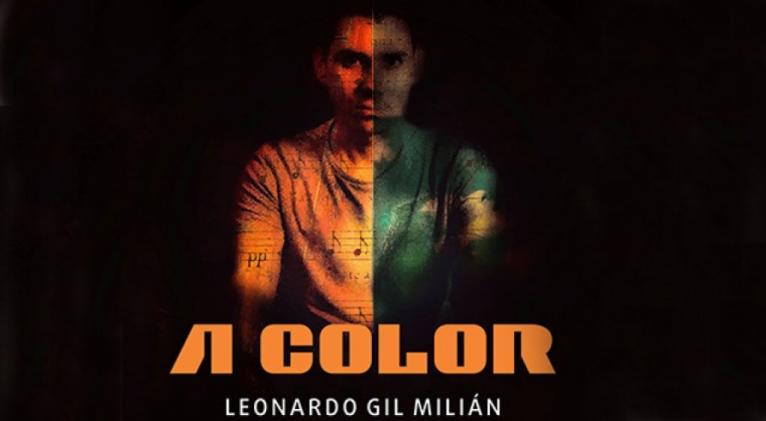Young and Artist: Leonardo Gil Milián’s “Colored” Music

“Musicians talk to each other. Youngsters take tips from experienced musicians: look, try to visualize joy or sadness in this melody. Then, everything is put into practice as if they were colors. You have to understand every feeling and take them into music. That’s the answer, the colors of music…”
The album is under the license of EGREM record label and should be ready for next year. But, can you give us now some details of the tracks we will find in “A Color”?
“The album basically proposes instrumental music, which narrates Cuban piano history, jazz, danzon, and rumba; summing up, all of them mixed with the modern piano. The CD is made of nine tracks. Eight of them are mine while there is also a version of Luis Casas Romero’s song Si llego a besarte, small format, featuring singer Alain Pérez, as special guest. I also have other guests and they are: Leoni Torres, Horacio el Negro —a very talented Cuban drummer—, Julito Padrón and Oliver Valdés, who are superstar instrumentalists, avant-garde musicians.
How do you feel with the final product?
“I am very happy with the CD. It really went beyond my expectations. Everything started like a game where I just wanted to listen to my song and then I began adding instruments and suddenly, I said wait…Let’s get real with this and I started from scratch. I felt free to experiment with my music and here is the result, the album. Friend and colleagues who have listened to the CD have congratulated me.”
Is it basically instrumental?
“The voice is in there, but instruments are the cornerstone…”
You graduated from piano. But when did your interest to write songs arise?
“I always liked classical music. I have studied it a lot. And I always dreamed of sitting in front of the piano and create something, try it at least. Not exactly with such sonority, though. We are living new times. I performed in JoJazz 2010 with two compositions. I won the top prize in the category and it stimulated my urge to write. One of the track in the CD, Contradanza, won the JoJazz, with new arrangements, of course. Listen…Seven years have passed.”
Despite your classical training, you have worked for some Cuban pop bands. How has it contributed to you?
“One thing is to study at school with books, programs, tests, and other —very different— is to perform in bars, clubs, theaters, or jazz studios. It gives you a completely different vision as you have to make music on your own, a music you and your public feel pleased with. You can be a musician who plays jazz and classical music, but you cannot limit yourself. That’s a mistake. I had the pleasure to play with Laritza Bacallao, Carlos Varela, Descemer Bueno, Alain Pérez, even in recordings and it opened my mind regarding how many musical genres I was able to play.”
“I like popular music. And I believe there is good music in Cuba with very good musicians and it is our duty to give our opinions in this regard, as we have the necessary studies and academic training. We must contribute somehow with these projects to perform —always professionally— that sort of genre which is more commercial, lighter apparently. To perform it with professionalism is tough.
Then, do you believe the path taken by the Cuban popular music is the right one?
Cuban music is generally very good and there are lots of talented musicians. And there is also very bad music, vulgar, with horrible lyric. However, there are artists who are trying hard to create a kind of music people may feel, and enjoy a refined lyric, musical production, arrangement…”
At present, you are the musical director in Leoni Torres’s band. How do you handle such responsibility?
“It is a great pleasure to work with Leoni. First, he is a very versatile musician. He never says no to any idea. He listens to every single suggestion. He is not a schooled musician but he has a great musical feeling and knows what he wants. Then he comes to you with an idea and our job is to take it into a musical approach; that is to say to describe in simple terms what every musical instrument must do to respect Leoni’s ideas. Simultaneously, our job is also that of improving the recording aimed at performing it live and the instruments needed to do achieve it. I have already spent five years with Leoni and two of them as his musical director.
You have music in your blood. How much of your family is reflected on your music?
“I was never told I must study music. I grew up in theaters. Love for music was instilled within me. My grandmother is mezzo-soprano in the opera house, soloist. My grandfather was also part of the Matanzas’ opera house. My father is a drummer. Hence, it was easy to talk about music at home and there were usually two or three percussion instruments here and there. I played with them when I was a kid. My mom was always singing and both taught me…But the greatest legacy is my taste for classical music. This is the core of everything.”
Any projects?
I am working on my second album and I would love to create my own project; a quintet perhaps, and start playing what I am doing, my music.”
Translated by Sergio A. Paneque Díaz / CubaSí Translation Staff













Add new comment